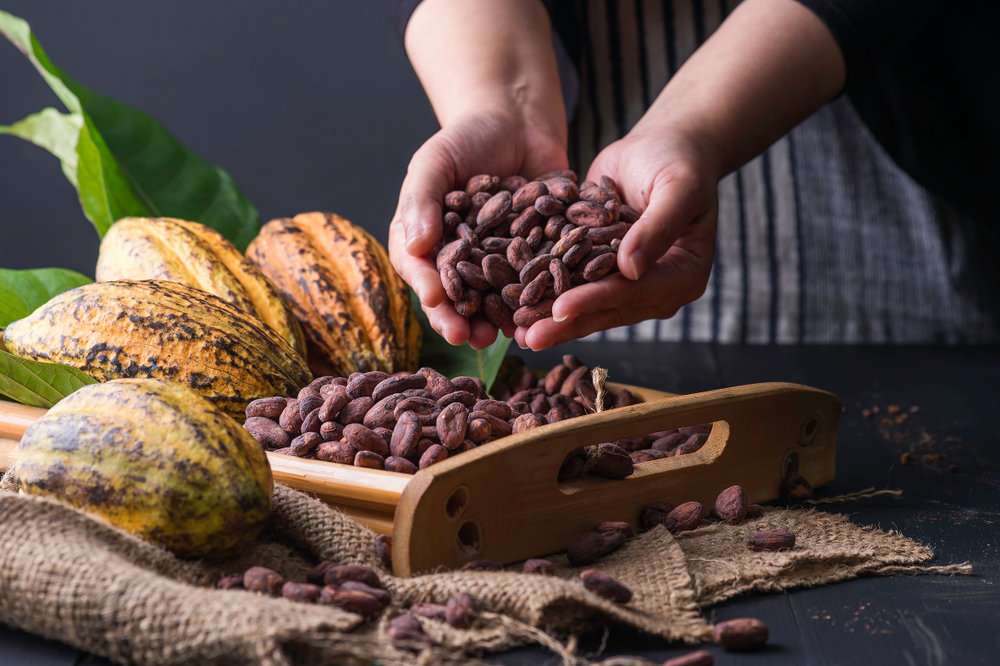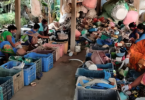Dutch television journalist Teun van de Keuken was shocked when he discovered that there is illegal child labor and forced labor on cocoa farms in West Africa. Chocolate producers were not. Eight of the largest chocolate companies signed a protocol in 2001 that condemned child labor and childhood slavery but consistently missed deadlines for putting an end to the practice.
As a result some 1.56 million children – ranging in age from 5 to 12 – are still engaged in child labor on cocoa farms in Côte d’Ivoire and Ghana, which together, produce nearly 60% of the world’s cocoa, according to figures from the National Opinion Research Center at the University of Chicago (NORC).
Van de Keuken finds that unacceptable. In 2005 he called every chocolate maker around the globe, but nobody would talk to him. During an episode of the Dutch television show ‘Keuringsdienst van Waarde’, he ate a pile of chocolate bars and turned himself in as a “chocolate criminal” to the Dutch authorities – the premise being that anyone who accepted the situation and benefited from the sale or consumption of chocolate produced under these conditions is guilty.
Van de Keuken and two of his journalist colleagues didn’t stop there. They created a company called Tony’s Chocolonely that wants to make 100% slave free and child labor free the norm for chocolate sold by all companies. The aim is to drive structural change towards a more equally divided cocoa chain.
The company, which sells its products in the U.S. UK, and continental Europe, sourced more than 14,002 metric tons of cocoa last year.
“We want to lead by example,” says Paul Schoenmakers, the company’s head of impact. His job is collaborating with the cocoa farmers who supply Tony’s – including all programs and activities involving partner cooperatives in Ghana and Côte d’Ivoire as well as working with governments and NGOs to accelerate change in the industry. One of the most important parts of his job is to actively support other companies that sell chocolate product to take responsibility for their value chains, through Tony’s Open Chain platform. Some ten companies – including Ben & Jerry’s ice cream – are now on the platform.
Schoenmakers and his team measure the impact of Tony’s Five Sourcing Principles (100% traceable beans, paying a higher price that enables a living income, strong farmers, long-term relationships, and quality and productivity). The idea is to not just report on progress but improve on it by using data to do things better.
Proving that impact and commercial success can go together the company – a certified B Corp – reported an overall year-on-year growth of 21% to reach €133.1 million in revenue while investing €8.2 million (6.2%) of revenue in impact.
Tony’s progress is an example of how purpose can make ethical supply chains a reality, contribute to the UN’s Sustainable Development Goals and help business be a force for good.
“There is nothing wrong with being profitable,” says Schoenmakers. “What is wrong is maximizing profit at the expense of human life and the environment. It is time for all companies to get serious about ESG [Environmental, Social and Governance].”
Combating The Dark Side Of Chocolate
Children are working illegally because cocoa farmers are unable to earn a living. Living income is set at $2.16 per person per day in Ghana and $2.49 in Côte d’Ivoire but excessively low cocoa prices mean many farmers earn under $1 a day, says Schoenmakers. As a result, smallholder farmers enlist children to work long hours, miss school and work under dangerous conditions – by using a machete, spraying chemical pesticides, or lifting heavy loads. According to the latest reports, on aggregate in Ghana and Côte d’Ivoire one in two children in every cocoa-growing household are put to work and 95% of these children engage in particularly hazardous forms of labor too . What’s more an estimated 30,000 adult workers on cocoa farms are victims of modern slavery, according to the Global Slavery Index.
There is also an environmental cost. When cocoa prices are too low, farmers try to make more money by selling more cocoa. That’s possible by planting cocoa trees in protected forest areas, which means natural forests are replaced by cocoa trees. As a result, deforestation is now widespread in West Africa.
The root of the problem is that big chocolate producers – who make huge profits – don’t pay a fair price for cocoa, says Schoenmakers. Governments around the world are just as much to blame, says Tony’s. By failing to legislate human rights due diligence both domestically and internationally, governments fail to hold companies accountable for human rights violations in their entire supply chains. “This hands-off approach leads to unfair sourcing practices and rampant exploitation that has allowed both to go unchecked,” Tony’s says on its website.
So how is Tony’s trying to bring about structural change? In addition to a Fairtrade premium Tony’s plays an additional premium so cocoa farmers can earn a decent income. Tony’s and its partners pay the Living Income Reference Price (LIRP) which exceeds the fixed price by 77% in Ghana and by 82% in Côte d’Ivoire. The premium helps increase the farmer’s income and enables them to invest in resources that increase productivity, such as agricultural training courses and nurseries for new cocoa tree, according to Tony’s. The premium also reduces their outgoing expenses by enabling them to buy fertilizer in bulk and install central water pumps and by making education more accessible. The company says that 9.9% of the retail price of Tony’s chocolate bars goes to the cocoa farmers.
As a result, 37.6% of Tony’s long-term partner farmers now earn a living income, according to the company. The ambition is to get that number to 100% but it can’t do the job alone as farmers are also selling beans to other companies at the fixed lower rate.
To date, big chocolate producers still have not committed to paying the kind of higher price that would enable cocoa farmers to earn a living income, according to Tony’s.
One of the roadblocks for improving conditions is the fact that beans from West Africa are all lumped into one pile when they arrive in Belgium. Big companies have said it is impossible to trace their source. Almost no chocolate brand sold in supermarkets knows where or how its cocoa beans are grown, says Tony’s. The producers have no relationship with the cocoa farmers and if the cocoa comes from West Africa they’re completely in the dark. This applies to the vast majority of certified (sustainably produced and organic) cocoa.
Tony’s is proving it can be done. Its Beantracker software gives the company updates on the cocoa supplied by Ghana and Côte d’Ivoire . It knows what volume of beans are being shipped and what is being processed in Belgium. It says it knows which farmers supplied what percentages of each shipping container of beans.
To bring about industry-wide change Tony’s advises companies not to buy anonymous beans but instead trade directly and on equal footing with cocoa farmers and cooperatives. “Make sure you know who produces the beans and also where and under which social and environmental conditions so your company will feel responsible and take action,” it advises on its website. It also encourages other companies to ensure that the farmers and cooperatives get at least five years commitment to sales at a higher price, giving them income security and enabling them to make better choices on investments and recouping costs.
To do its part to stamp out child labor Tony’s started implementing the Child Labor Monitoring and Remediation System (CLMRS) developed by the International Cocoa Initiative (ICI) and Nestlé so it can more closely monitor the risk of illegal child labor at its partner cooperatives in Ghana and Côte d’Ivoire. The system addresses the issue of child labor in cocoa production and helps improve the living conditions of the farmers. If farmers supply cocoa for Tony’s their children are monitored. Besides raising awareness of the consequences of child labor in cocoa communities, Tony’s also gather social data to ascertain whether, where and why child labor is being used. Once the company understands the reasons, it says it tries to find permanent solutions. “We do this together with ICI, our partner cooperatives, the communities in West Africa and other key players, because only together can we solve the problem,” the company said in a statement.
Some cases still slip through but in contrast to the industry-wide average of 46.5% the percentage of children in child labor at the coca-growing communities that Tony’s works with is 4.4,% according to its latest company report. I am proud that we can find cases,” says Schoenmakers. “That is the first step in solving a problem.”
While Tony’s is proud of its own results it wishes the rest of the industry would do more to ensure that the entire cocoa supply chain is ethical. “We are not happy with the slow pace,” says Schoenmakers. “It will take a while, but I am convinced we can get it done.
Measuring Progress
The name “Chocolonely’ was chosen for the company because at the time of launch 18 years ago it was the only chocolate company waging a war for change.
In 2018 the OECD developed practical guidance to ensure business can be conducted more responsibly, including throughout global supply chains. The guidance helps companies assess, address and avoid potential negative impacts of their activities, from working conditions and labour abuses, to environmental damages and human rights violations. The 2023 edition of the Guidelines provides updated recommendations for responsible business conduct across key areas, such as climate change, biodiversity, technology, business integrity and supply chain due diligence, as well as updated implementation procedures for the National Contact Points for Responsible Business Conduct.
A network of National Contact Points for Responsible Business Conduct (NCP) was also created to address and resolve cases of potential non-compliance to the OECD guidelines and today 48 countries around the world have committed to establishing an NCP. Anyone can submit a grievance to an NCP concerning any business operating ‘in or from’ their country which is causing or linked to alleged corporate, social, environmental, labor or human rights abuses. This process can lead to remedy for victims and bring about significant changes in corporate conduct, contributing to the prevention of future harms.
Despite these measures and Tony’s own high-profile fight the cocoa supply chain still has a long way to go to improve. The campaign group Be Slavery Free recently conducted an analysis of 56 of the world’s largest cocoa buyers, creating an individual ‘Chocolate Scorecard’ for each one. The study aimed to assess brands and retailers who account for 95% of global chocolate products, based on six key factors: perceived level of transparency in their supply chains, payment of living wages to workers, use (or not) of child and forced labor, and impact on deforestation, agroforestry, and agrichemical management.
Good Egg awards went to Tony’s Chocolonely for seeking to bring structural change to the entire cocoa sector through collaboration and Original Beans for their regenerative approach to growing and making chocolate. The Rotten Egg Award went to General Mills and Walmart for their lack of public policies and commitment for their cocoa procurement. A general lack of transparency in implementing their policies makes it difficult to hold them accountable, according to Be Slavery Free.
The analysis found that less than half of the surveyed chocolate companies had policies in place to set out expectations or improvement plans for suppliers, including the potential to end the working relationship for continued non-compliance.
The report also highlighted that countries such as Côte d’Ivoire and Ghana have lost around 94% and 80% of their forest cover in the past 60 years, with roughly one third of this forest loss attributed to cocoa growing. The study concluded that the cocoa industry has contributed significantly to deforestation,
Doing Nothing Is No Longer An Option
With continuing scrutiny from consumers, activists and the media — and growing interest from investors — companies are now under more pressure than ever to meet obligations over responsible sourcing.
Consumers are becoming concerned about issues such as living wages, labor rights, and social responsibility and are willing to pay more for products that have been sustainably sourced., according to a June McKinsey report. Around 60% of surveyed consumers would be willing to pay more for products when employee safety and no child labor are guaranteed, says the report. This is the same proportion of consumers who are willing to pay more for products when packaging is minimal or made from recycled materials, according to the report.
Regulators are more concerned too. With increasing environmental, social, and governance (ESG) regulations—such as the German Supply Chain Act, as well as child labor and modern slavery legislation—social responsibility and compliance are likely to continue their march up the corporate agenda, says the report.
And there may be even more at stake: emerging data indicate that ESG-compliant businesses have an added edge, says the McKinsey report. Companies with higher ESG ratings have a 10 % to 20% valuation uplift compared to their peers, while ESG leaders also benefit from better financing availability and terms. A living wage, as opposed to a minimum wage, can reduce worker turnover by 30%, says the report. What’s more employee engagement is four times higher in purpose-driven companies and there is also a 36 % greater likelihood for ethnically diverse companies to outperform their peers.
To maintain their reputation and get better results consumer package good companies now face a choice: go it alone and build the capabilities in-house for robust supply chain scrutiny and governance, or partner with a leading assurance provider who can provide the necessary oversight to ensure responsible sourcing. “What is clear from the current operating environment,” says the McKinsey report “ is that companies no longer have the choice to do nothing at all.”
This article is content that would normally only be available to subscribers. Sign up for a four-week free trial to see what you have been missing.
To read more of The Innovator’s Energy Transition stories click here.







